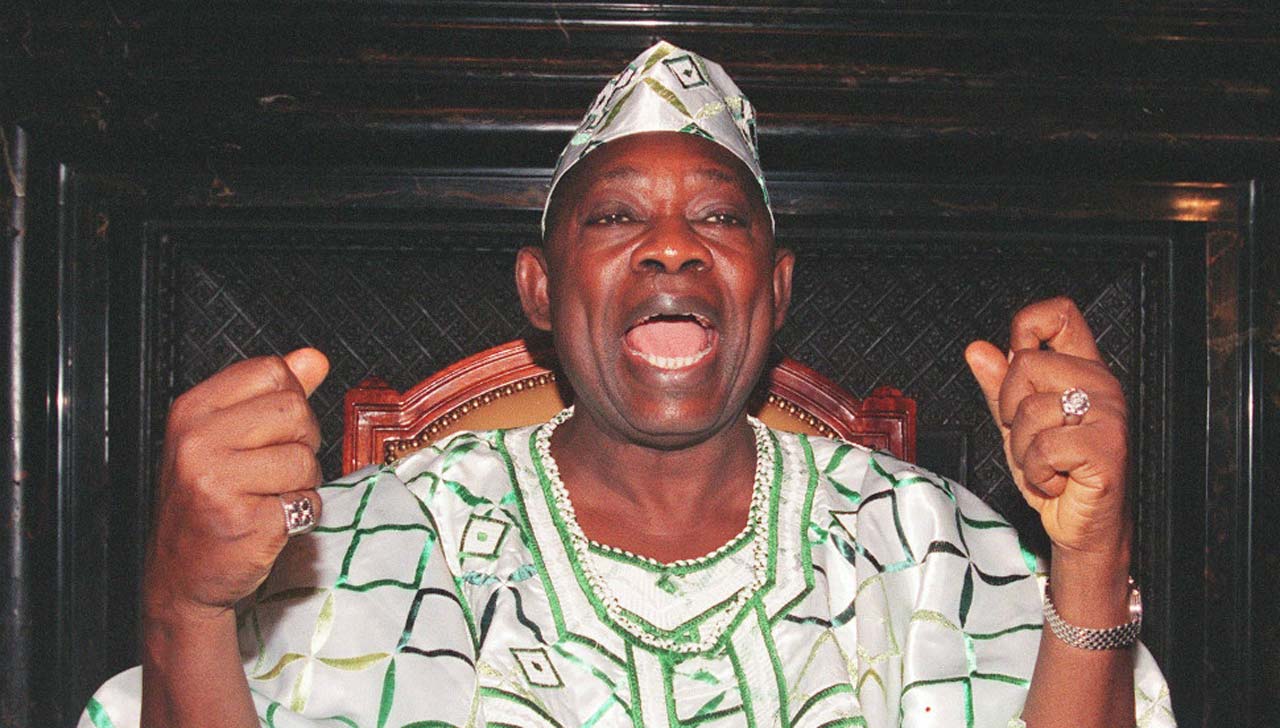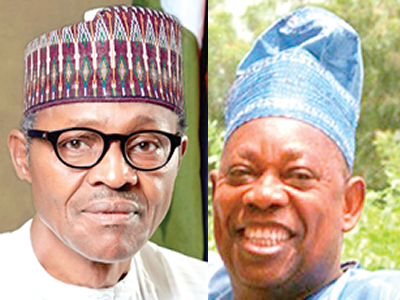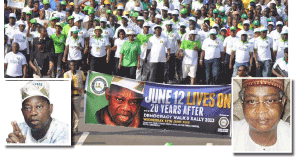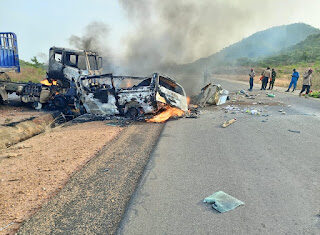By Emeka Alex Duru

Like a ghost, it refused to go. Rather, it kept haunting the nation. From 1993 when it afflicted the nation, the phenomenon, like a bug, has stuck, traumatizing and discomforting successive administrations in the land – military and civilian.
Not even the hastily contrived May 29 Democracy – whatever that meant in Nigeria’s history, – could keep it at bay. But like a sore thumb, it kept festering, drawing attention and yelling for recognition, even when some of its advocates had gone to the great beyond.
But what, really is in a name, as celebrated writer, William Shakespeare, would ask? In this case, what is in a date? Put in other words, what is in June 12?
This is a question successive administrations in the land had tried to suppress since 1993. For 25 years, they had laboured to blot the date and what it represents. But try as the governments had done, the phenomenon had refused to die.
On occasions, it had limped and lingered. On such instances, the celebration had been limited to some sections of the country, particularly the south west. Even at that, the spirit had been unyielding.
But at last, like the Greek Prometheus unbound, the date has bounced back, with renewed force, inching, probably, to regain the lost ground, perhaps, not in concrete terms, but in the conscience and consciousness of the people.
Buhari resurrects June 12

President Muhammadu Buhari, whose pre-2015 election profile, has dwindled greatly these days on account of the clay footed direction of the policies of his administration, gave a voice to June 12, in a move that has shored up his democracy credentials.
In a deft political move that may warm him into Nigerians, particularly pro-democracy activists, Buhari, on Wednesday, June 6, 2019, conferred on late MKO Abiola, presumed winner of June 12, 1993 presidential election, the posthumous honour of the Grand Commander of the Federal Republic (GCFR). Abiola died 20 years ago.
The President equally conferred on Babagana Kingibe, Abiola’s running mate in the election, the award of the Grand Commander of the Order of the Niger (GCON).
Late human rights lawyer, Gani Fawehinmi (SAN), was also accorded posthumous honour of GCON.
Buhari also declared June 12, Democracy Day, in replacement of May 29, that has since 1999, been celebrated for the occasion.
He made the declaration in a press statement personally signed by him.
The statement read in part; “June 12, 1993, was the day, when Nigerians in millions, expressed their democratic will in what was undisputedly, the freest, fairest and most peaceful elections since our independence. The fact that the outcome of that election was not upheld by the then military government, does not detract from the democratic credentials of that process”.
Going by the new development, June 12, will be observed as public holiday, subsequently, in place of May 29.
Revisiting June 12
June 12, 1993, was the day Nigerians went for a presidential election that was mostly adjudged free and fair.
Abiola, who was the presidential candidate of the defunct Social Democratic Party (SDP), was almost coasting home to victory over his opponent, Bashir Tofar of the then National Republican Convention (NRC), when the military administration of Ibrahim Babangida, annulled the election, claiming that the exercise was dogged by irregularities.
Abiola who was bent on actualizing his mandate, was clamped into detention by the succeeding General Sani Abacha regime.
He did not achieve the desire till he died under General Abdulsalami Abubakar administration, on July 7, 1998.
Abubakar, who ran an 11-month political transition programme, later handed over to the civilian government of Olusegun Obasanjo on May 29, 1999.
May 29 has been celebrated as Democracy Day, with public holiday, since then.
Notwithstanding, Abiola’s supporters had been clamouring for his recognition and June 12, celebrated as real Democracy Day.
Three years into office, Buhari has acceded to the demand. He however, did not fully pronounce Abiola as the winner of the election. He referred to him, rather, as the presumed winner.
Nigerians react
Even without the President outrightly declaring Abiola the winner of the election, his conferment of the GCFR honour on him, and recognition of the election date as the real democracy day, have earned him admiration of some Nigerians.
Abiola’s daughter, Hafsat Abiola-Costello, who had kept the fire of June 12 aglow with other activists, could not hide her excitement on the development.
In a poem she scripted to express her feeling at the moment, she wrote; “There are no words that can capture the depth of my gratitude nor the breadth of my joy. I thank God that I am alive to witness this day.”
Lagos State governor, Akinwunmi Ambode also hailed the announcement by the President.
The governor, in a statement by his Chief Press Secretary, Habib Aruna, lauded the President, saying that the development was a historic and symbolic moment in the nation’s political trajectory.
“This is a welcome development. It is a historic moment in our nation and I join other Nigerians to commend President Buhari on this announcement. By this move, he has done what previous administrations failed to do”, the statement added.
Other Nigerians from other parts of the country, also lined up in celebrating the action.
Not even the observation by the former Chief Justice of the Federation, Justice Alfa Belgore, that the national honours should not be awarded posthumously, much less the GCFR, which is the highest honour in the land, could sway the mood of those excited by the award.
“It (the GCFR honour on Abiola) is for people living. The only thing they could do is to name a place after him, but national honours award, no”, Belgore, the chairman of 2016 National Award Committee, observed.
But Professor Bolaji Akinyemi, former External Affairs Minister and erstwhile Director General, Nigerian Institute of International Affairs (NIIA), Lagos, disagrees, arguing that there is nothing wrong with the conferment.
“I disagree with him (Belgore). This is an issue that goes beyond strict legal interpretations. It is not a legal matter. You have got to be flexible without embracing illegality.
“My take on this issue is that Abiola was elected President in 1993, and that is when he acquired GCFR which is only for Presidents or anybody the president wants to honor like Shagari honoured the late Chief Awolowo. That was when he acquired it.
“The election was annulled. And it was the annulment that was de-annulled. So, it was not a dead body that was elected President. It would not have been a dead body that would have acquired the GCFR if the processes had been completed in 1993”, he stated
Not minding the arguments on the matter, the President had gone ahead, to carry out the conferment of the award on Abiola and other recipients at the conference hall of Aso Rock Villa, Abuja.
Beyond June 12 recognition
Apparently reading political undertone in the action, leading opposition party, the Peoples Democratic Party (PDP), has scoffed at the gesture, challenging the President to tell Nigerians what he did either to save the mandate or to secure freedom for the late business mogul.
In a statement, the party had wondered how the same Buhari, who was a prominent figure in the government of the late despot, General Sani Abacha, under whose gulag, the late politician was incarcerated and later died should turn around and be gifting him with such high honours, just a year to his re-election, stressing that the exercise smacked of nothing less than hypocrisy and political desperation ahead of 2019 presidential election.
PDP, while declaring that the President’s action merely sought to use the name and person of Abiola to gain political capital and not out of genuine reverence and recognition for him, insisted that nothing had come from him before now to show he was sympathetic to either the June 12 or Abiola’s travails.
“It is therefore a sign of political desperation for President Buhari to seek to use Chief Abiola’s name as a tool to sway Nigerians in less than twelve months to an election where he, (President Buhari) is seeking a second term,” said the party in a statement, signed by its spokesman, Kola Ologbodiyan.
The other question many have asked since the declaration, is what happens to May 29 handover/swearing-in day, given the turn of events.
Since 1999 when Obasanjo and the first set of governors were sworn in in the current dispensation, May 29, had served the purpose of inauguration of the President and governors, except in states where there had been judicial interventions resulting in rescheduled elections.
Therefore, since there has not been any interruption in the inauguration of any of the Presidents since 1999, every May 29, makes it exactly four years of a term.
Lagos lawyer, Nnanna Ezeocha, insists that the May 29 inauguration date, remains sacrosanct. “What the President has altered is merely the name, “Democracy Day”, not the swearing-in date. That is constitutional. It cannot be extended by even a second. So, there is no cause for alarm. The President, I am sure, knows that and will be guided accordingly”, he said.
Closely related to this observation is the public holiday that will now be observed on June 12 as against May 29. Ezeocha noted that it is after the National Assembly would have consented to the June 12 public holiday proposal from the President that the issue of how to celebrate May 29 handover date, would be attended to.
For now, Nigerians are in the dark, on how to mark the May 29 swearing-in day, subsequently.













